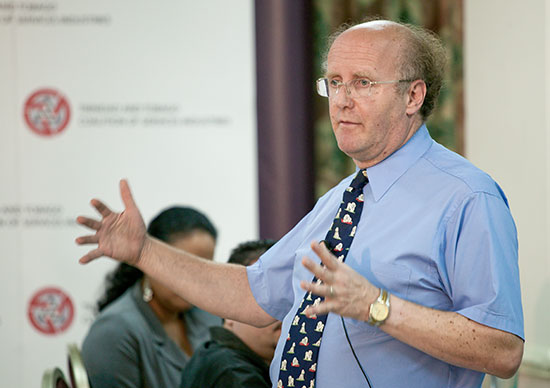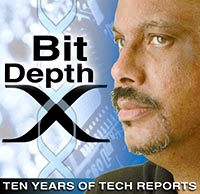BitDepth 705 - November 10
09/11/09 21:43 Filed in: BitDepth - November 2009
Maurice Pensak's talk at the TTCSI's service week fell somewhere between his work with technology and innovation.
Firewall inventor on breaking down walls

Dr David Pensak speaking at the TTCSI's session on information technology. Photography by Mark Lyndersay.
Dr David Pensak is an enthusiastic proponent of his newest product, the idea of driving innovation into the slowest moving parts of any business system.
In the nineties, his company, Raptor Systems brought the first commercially available firewall to market. Now he is an evangelist of innovation, an equally abstract concept that he explores in his book Innovation for underdogs, written with Elizabeth Licorish.
Pensak planned to give a talk titled "Whither IT in a changing world" to an audience mustered under the newly minted banner of the Trinidad and Tobago Coalition of Services Industries (TTCSI). This organisation is charged with the responsibility for issuing certificates of registration to Caricom service providers and under CEO Nirad Tiwarie, hosted their National Services Week, from November 01 to 06.
It's unclear what led Pensak to change his game plan for the TTCSI event, but he largely abandoned his presentation, skipping through it to find points of relevance to his audience. The result seemed jerky and disconnected and skittered between topics to variable effect.
Promoted in advertisements for his decade-old work with computer security systems and speaking at an event sponsored by a leading ICT provider, Pensak seemed to be trying to find a way to bridge a technology talk with his work with innovation.
Some interesting points got made, among them concerns about information overload: "You aren't sipping from a firehose anymore, they have epoxied the hose to your mouth and turned it on full. We are seeing the limits of human intelligence in handling this flood of information."
Data analysis by dummies
Pensak cautioned his audience against excessive data processing without commonsense analysis, which can lead to solutions that deepen rather than solve problems.
The programmer turned innovation motivator called on a rich selection of anecdotes and stories to illustrate his concepts. Describing data analysis gone wrong, he cited a study by US banks which discovered that people who recently lost a spouse were spending three times more than they had prior to their loss.
The bankers' solution was to clamp down on credit limits for the recently bereaved, sometimes reducing them by half. Deeper investigation, and probably angry response, revealed that these people were having to pay bills that were previously handled by their lost ones.
"Instead of helping..." Pensak said with an expressive spread of his hands.
In another example, he recounted the story of an analysis project which reviewed the problem of lost golf balls on a golf course. The golfers were spending more time looking for the tiny white orbs than they were playing.
As it turned out, this was a pretty good deal for the golf course, who had less wear and tear on their greens, so there wasn't a problem at all.
The workshop segment of Pensak's talk seemed to be much tougher going. His audience only seemed to engage his points tangentially and with some trepidation.
A workshop session about the depth of knowledge in IT organisations, analysed through a knowledge matrix, prompted responses that were tentative and cautious.
Participants didn't seem comfortable with a grid that broke out their business systems into not just business knowledge, but a contemplation of business ignorance.
It's hard to imagine what the small group made of his idea of aggressively building rewards for taking risks in the competitive marketplace and minimising the application of penalties for undesirable performance.
As Dr Pensak wrapped up his talk, it wasn't clear that his briefing had matched the expectations of the audience or his own ambitions for the talk. There was, cumulatively, some advice on security, some concerns about cloud computing and some interesting concepts likely to inspire some thinking about innovation where the notions fell on fertile, attentive ground.

Dr David Pensak speaking at the TTCSI's session on information technology. Photography by Mark Lyndersay.
Dr David Pensak is an enthusiastic proponent of his newest product, the idea of driving innovation into the slowest moving parts of any business system.
In the nineties, his company, Raptor Systems brought the first commercially available firewall to market. Now he is an evangelist of innovation, an equally abstract concept that he explores in his book Innovation for underdogs, written with Elizabeth Licorish.
Pensak planned to give a talk titled "Whither IT in a changing world" to an audience mustered under the newly minted banner of the Trinidad and Tobago Coalition of Services Industries (TTCSI). This organisation is charged with the responsibility for issuing certificates of registration to Caricom service providers and under CEO Nirad Tiwarie, hosted their National Services Week, from November 01 to 06.
It's unclear what led Pensak to change his game plan for the TTCSI event, but he largely abandoned his presentation, skipping through it to find points of relevance to his audience. The result seemed jerky and disconnected and skittered between topics to variable effect.
Promoted in advertisements for his decade-old work with computer security systems and speaking at an event sponsored by a leading ICT provider, Pensak seemed to be trying to find a way to bridge a technology talk with his work with innovation.
Some interesting points got made, among them concerns about information overload: "You aren't sipping from a firehose anymore, they have epoxied the hose to your mouth and turned it on full. We are seeing the limits of human intelligence in handling this flood of information."
Data analysis by dummies
Pensak cautioned his audience against excessive data processing without commonsense analysis, which can lead to solutions that deepen rather than solve problems.
The programmer turned innovation motivator called on a rich selection of anecdotes and stories to illustrate his concepts. Describing data analysis gone wrong, he cited a study by US banks which discovered that people who recently lost a spouse were spending three times more than they had prior to their loss.
The bankers' solution was to clamp down on credit limits for the recently bereaved, sometimes reducing them by half. Deeper investigation, and probably angry response, revealed that these people were having to pay bills that were previously handled by their lost ones.
"Instead of helping..." Pensak said with an expressive spread of his hands.
In another example, he recounted the story of an analysis project which reviewed the problem of lost golf balls on a golf course. The golfers were spending more time looking for the tiny white orbs than they were playing.
As it turned out, this was a pretty good deal for the golf course, who had less wear and tear on their greens, so there wasn't a problem at all.
The workshop segment of Pensak's talk seemed to be much tougher going. His audience only seemed to engage his points tangentially and with some trepidation.
A workshop session about the depth of knowledge in IT organisations, analysed through a knowledge matrix, prompted responses that were tentative and cautious.
Participants didn't seem comfortable with a grid that broke out their business systems into not just business knowledge, but a contemplation of business ignorance.
It's hard to imagine what the small group made of his idea of aggressively building rewards for taking risks in the competitive marketplace and minimising the application of penalties for undesirable performance.
As Dr Pensak wrapped up his talk, it wasn't clear that his briefing had matched the expectations of the audience or his own ambitions for the talk. There was, cumulatively, some advice on security, some concerns about cloud computing and some interesting concepts likely to inspire some thinking about innovation where the notions fell on fertile, attentive ground.
blog comments powered by Disqus

